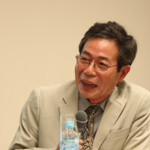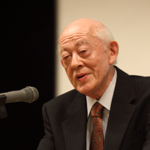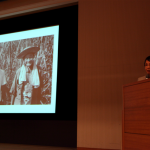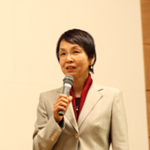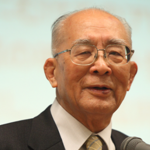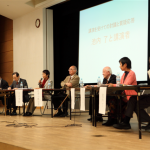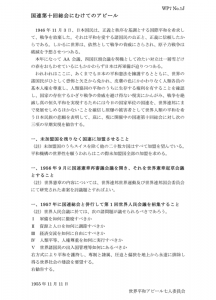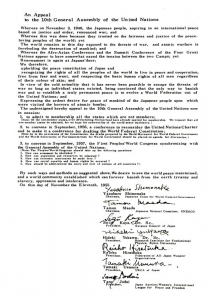An Appeal to the Peoples of the World of Today and Tomorrow
issued by
the Committee of Seven for World Peace Appeal
on its 50th Anniversary
11 November 2005
The Committee of Seven for World Peace Appeal conscious of the responsibility of all of us living in a nuclear age was founded today fifty years ago, on 11 November 1955. It was when the Russell Einstein Manifesto called the governments and peoples of the world to unite in opposition to the threat of a nuclear war. The nuclear weapon test on the Bikini Atoll in the Pacific Ocean had shocked the whole world the previous year. Since then the Committee has continued to issue appeals seeking the rapid abolition of nuclear weapons and the creation of a new world order based on the pacifist principles of the Constitution of Japan, and the non-military solutions of all conflicts through a strengthened United Nations. Their number has reached eighty six in the first 50 years.
Fifty years have past since the time the Committee was founded, and the world situation has changed. We face a new crisis has risen in the world under the forceful rule of a single hegemonic State and a mounting tide of peoples movements opposing it. We find that this situation makes it, unfortunately, more necessary and more urgent for us to appeal to the world. We make the present appeal to the United Nations and to its member States. We hope that the citizens of Japan and of the world join us in making similar demands to these institutions.
1. We demand the immediate total abolition of all nuclear weapons:
In spite of the fact that nuclear weapons are arms driving humankind to self-destruction, the nuclear powers continue to rely on them. Humankind, however, succeeded in preserving the planet earth from annihilation, by binding the hands of the Super-Powers forcing them not to use nuclear weapons for the past fifty years, in spite of a number of critical moments. This is a proof of human wisdom, and the fruit of the efforts of the people who has continued to point out the danger of these weapons by their words and their action.
With the end of the Cold War, the danger of self-annihilation of humankind by a nuclear war between the Super Powers disappeared, but the threats of the use of nuclear weapons have increased, including the possible use by terrorist groups. The research and development of new types of tactical nuclear weapons turned them, from “unusable weapons”, into “usable” ones, increased the danger of nuclear wars, and accelerated nuclear proliferation.
Under these circumstances, we reiterate our call for the full implementation of the Treaty on the Non-Proliferation of Nuclear Weapons (NPT), and demand that the nuclear powers pursue negotiations in good faith for the cessation of the nuclear arms race at an early date and to nuclear disarmament, in line with its Article 6. We, further, demand to realize the unequivocal undertaking by the nuclear-weapon states to accomplish the total elimination of their nuclear arsenals leading to nuclear disarmament, to which all state parties are committed under the above Article, as was agreed at the 2000 Review Conference of the parties to the Treaty on the Non-Proliferation of Nuclear Weapons.
2. We call upon all States to resolve all conflicts through peaceful means, and to repudiate all armed forces and any claim to the right to wage war:
The above appeals, issued, time and again, during the past fifty years by our predecessors, has unfortunately, been ignored by the international community, with a few praiseworthy exceptions. In addition, the post Cold War world is characterized by a proliferation of domestic conflicts involving armed non-State actors, and the mutual reprisals between the States and the non-State terrorists violates the right to live in peace of the peoples of the world.
The peace enforcements and the punishments of “rogue States” using an overwhelming military force do not only fail to fulfill their objectives, but victimizes many of the most vulnerable peoples.
We call upon the United Nations and all its member States to declare that they renounce war and the use of military force, in all conflicts, international or domestic, and to submit all offenders to the jurisdiction of the International Criminal Court.
3. We demand that the United Nations and all other international organizations, as well as their member States promote reforms towards a multi-cultural world based on the principles of “peaceful Coexistence” and “Equal mutual-benefit”, ao as to guarantee the security of all peoples, in full cooperation with the citizen movements.
Our predecessors in the Committee appealed for the building of a world order based on the principles of the World Federalist Movement. The world has evolved from one where the States were the only actors with real power, into one where the power of the citizens can even compete with the States. The citizens of the world operate actively in all the world regions, in full equality between genders, generations, religions, classes and social statuses, with the equal participation of different identity groups.
We call upon the United Nations and all other international organizations to replace top-down unilateral global governance led by the Super Power by a global governance system based on federalist principles firmly based on the peace-building efforts of the citizens.
While making the above three demands, in appealing to the world from Japan, the Committee of Seven for World Peace Appeal calls upon the State of Japan to take the lead in implementing them. To that end we make the following three demands to its Government.
4. We strongly demand that Japan keep the ideals and principles of the Constitution of Japan and promote them actively.
In Japan today, the revision of the Constitution is under public discussion. However, the Constitution of Japan has been formulated as a self-criticism about a War which involved the whole world beginning with Asia, with a firm resolve not to go to war again. This Constitution represents the achievement of the search for peace of humankind, and is a crystal of the wish of all peoples of the world.
We recognize this historical meaning of the Constitution and oppose any easy-going attempt to abrogate it. We demand that the three legal ideals and principles of the present Constitution, the “right to live in peace”, “the peaceful resolution of international conflicts”, and “the renunciation to military force and to the right to wage war” be kept by any text proposed in revising the Constitution.
The Preface of the Constitution of Japan proclaims that Japan is determined to preserve its security and existence, “trusting in the justice and faith of the peace-loving peoples of the world”, and recognizes that “all peoples of the world have the right to live in peace, free from fear and want”.
We welcome the fact that the Government of Japan makes “human security” a key principle of its diplomacy, thus, proclaiming internationally the “right to live in peace”. We, therefore, cannot but feel a deep concern about all discussion of abrogation which ignores the fact that it is this Constitution that provides the ground of this right.
5. We demand the creatinon of a Nuclear-Free Zone of East Asia including Japan.
In spite of the ideals and principles expressed in its Constitution, Japan relies on the military forces, based on the so-called “nuclear umbrella” of the United States through its Mutual Security Treaty with this Country. As a consequence, Japan developed an excessive military capacity, and an imbalanced economy, thus, receiving criticism from its Asian neighbors.
We must reject the illusion that nuclear weapons are useful for security, revise the reliance on s “nuclear umbrella”, and rake an active role in building security on a regional arrangement based on the renunciation to nuclear armament. A Nuclear-Weapon-Free Zone in North-East Asia will make it possible further to promote political and economic cooperation among the regional countries and remove all causes of human insecurity from the region, through an autonomous regional effort based on the principles of “peaceful coexistence” and “equal mutual-benefit”.
6. We demand that Japan develops an Asian Diplomacy towards a genuine co-existence with the peoples of Asia.
The Government of Japan should shift from a U.S. dependent diplomacy to diplomacy of giving priority to Asia, while keeping friendly relations with it.
The military bases of the United States in Japan, supported by Japanese budgetary contributions, are currently reorganized according to the American global strategy in the arc of insecurity reaching the Middle East. The plan of disposition of a nuclear-powered carrier to a US navy base in Yokosuka is intended in the strategy. This situation which does not correspond to the Japan U.S. Mutual Security Treaty generates new military threats in the world, especially in Asia, and provide ground for terrorist activities.
We demand that the Government of Japan take into serious consideration the voice of the peoples of Okinawa, Kanoya, Iwakuni, Yokosuka, Zama, and of other localities neighboring U.S. military bases, who oppose the reported agreements between the Governments of Japan and of the United States on the military bases in their locality, and thus increase their sense of insecurity. We demand that the Government of Japan give top priority to the security of its people and of its land in its negotiation with the United States. We believe that this will provide the base for building a new age of stability in the Asia Pacific region.
On the occasion of its fiftieth anniversary, the Committee of Seven for World Peace Appeal wishes to contribute to world peace through three appeals to the United Nations, its member States and to their citizens, and through three appeals to the Government and to the civil society of Japan.



